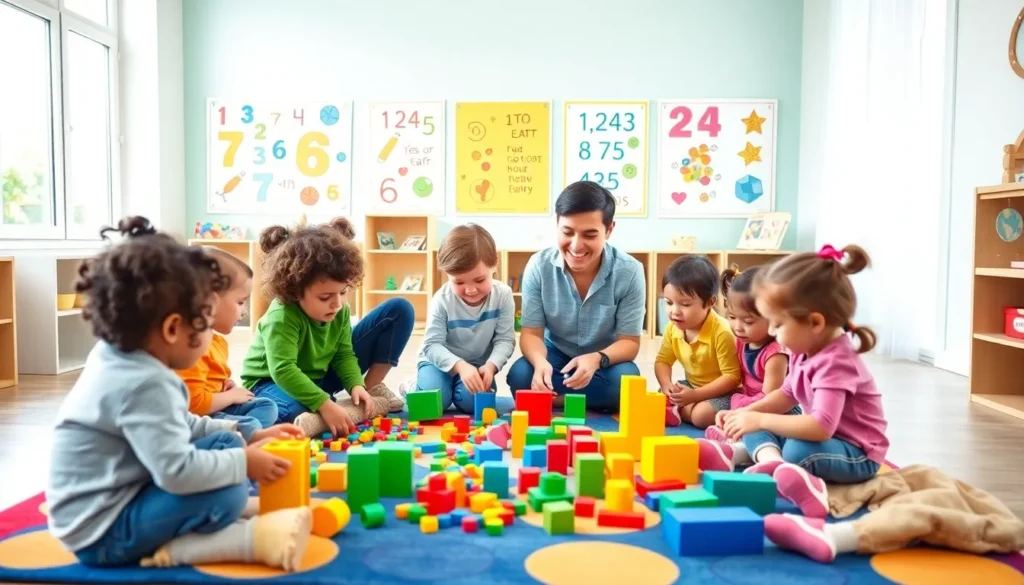Table of Contents
ToggleWhen it comes to preschool math curriculum, many parents envision a sea of numbers and equations, leaving little ones overwhelmed and unable to enjoy learning. But fear not. Math can be fun, lively, and engaging, like a game of hide-and-seek but with numbers. Early math education plants the seeds for future academic success, developing critical thinking and problem-solving skills while keeping preschoolers engaged. So, let’s jump into the intriguing realm of preschool math and uncover why early math education is essential and how to make it enjoyable.
Importance of Early Math Education

Early math skills are foundational. They build on children’s innate curiosity about the world around them.
Research shows that proficiency in math during preschool is linked to higher academic achievement later on. It’s not just about counting: it’s about understanding relationships, quantities, and patterns. These skills extend beyond the classroom, aiding children in their social interactions and decision-making processes.
Also, early math education also promotes cognitive development. As children engage in mathematical thinking, they learn to categorize, compare, and classify, which are critical thinking skills essential for school readiness. Introducing math at a young age cultivates a growth mindset, enabling children to tackle challenges with confidence.
Key Concepts in Preschool Math
Understanding key concepts in preschool math lays the groundwork for more complex ideas later. Here are some critical building blocks:
- Number sense: Children should recognize numbers and understand their relationships. Activities like counting objects or singing number songs can help.
- Patterns: Identifying and creating patterns fosters analytical skills. Using toys or blocks to create color patterns can enhance this understanding.
- Shapes and spatial awareness: Recognizing shapes and their attributes cultivates spatial reasoning. Sorting shapes in a classroom can make this learning tangible.
- Measurement: Introducing concepts like size, length, and weight through hands-on activities teaches children to compare and contrast objects, thereby reinforcing their understanding.
Developing a Comprehensive Math Curriculum
A comprehensive preschool math curriculum should be well-structured yet flexible enough to cater to different learning styles.
Begin by defining the learning objectives, ensuring they align with early childhood education standards. Research indicates that combining structured lessons with open-ended activities enhances understanding.
Integrating various teaching modalities like visual aids, hands-on tasks, and digital resources can cater to diverse learners. Regularly revisiting concepts ensures reinforcement and retention of skills. Activities such as group counting games and interactive math stories can make lessons feel more cohesive and engaging.
Effective Teaching Strategies for Preschool Math
Successful math instruction relies heavily on effective teaching strategies. Here are some methods that shine:
- Use manipulatives: Physical objects like blocks or counting beads allow children to visualize and experiment with numbers.
- Incorporate storytelling: Relating math concepts through stories isn’t just fun: it enriches understanding. Take a tale like ‘The Very Hungry Caterpillar’ and count food items along the way.
- Encourage exploration: Allowing children to explore math through play ensures they discover principles independently. Watch as they problem-solve while they build their own creations with blocks.
- Promote collaboration: Group work fosters communication skills and lets children learn from each other. Fun math activities in pairs can strengthen these bonds.
Integrating Play into Math Learning
Play is central to learning in preschool, and integrating math into playtime makes learning less daunting.
Create playful math experiences through games that involve counting and matching. Activities such as scavenger hunts where children search for items that match a specific number or pattern make learning dynamic.
Art projects can also introduce math concepts, making collages from shapes or creating patterns with colors not only promotes creativity but also enhances mathematical understanding. Remember, when children engage in play, they absorb information more effectively, positively impacting their retention.
Assessing Math Skills in Preschoolers
Assessment in preschool should be ongoing and organic rather than formal or stressful.
Observe children during activities to see how they manipulate objects and engage with numbers. Are they counting correctly? Can they identify shapes?
Regular check-ins can help educators tailor instruction to meet each child’s needs. Keep in mind that assessment should focus on growth rather than perfection: celebrating small victories will keep kids motivated and eager to learn.





